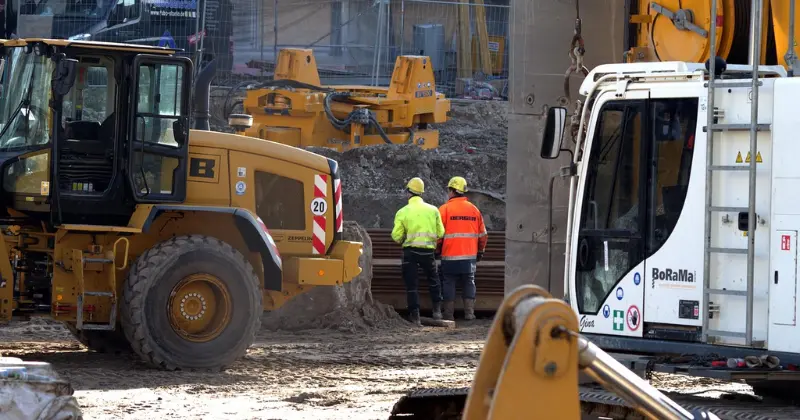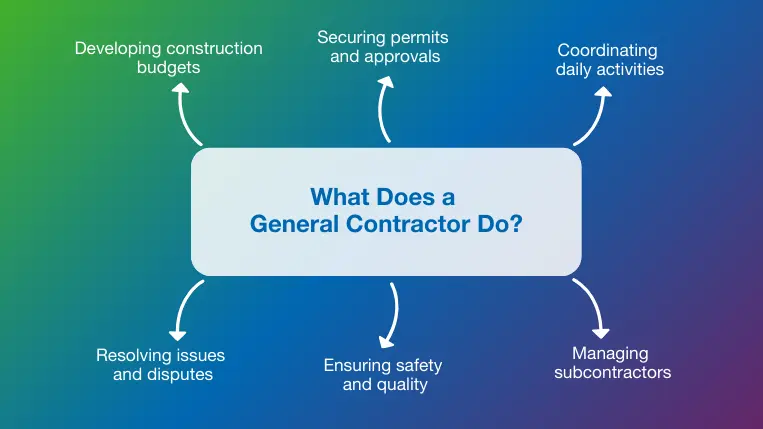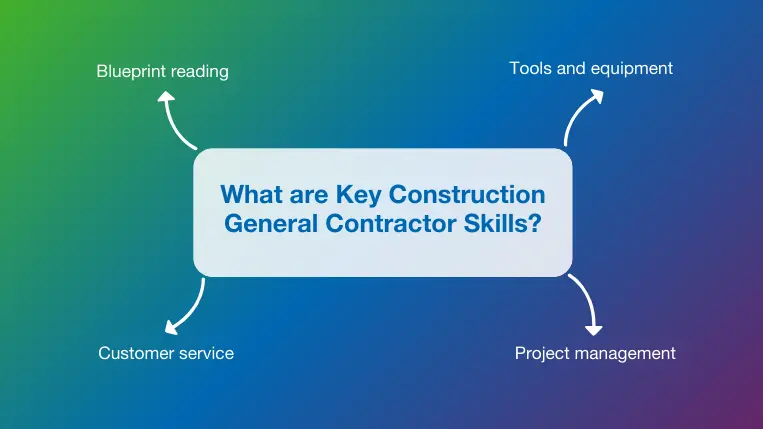11 mins read
The Role of the Construction General Contractor: Skills & Responsibilities of the Project Leader

Contractors and specialists of all types work towards common quality and project completion goals that define success. The construction general contractor is a central point of contact for all important jobsite activities, with oversight and coordination responsibilities that help to overcome obstacles throughout the project lifecycle.
As digital tools and technologies have entered the mainstream, the role of a general contractor has continued to evolve, making their tasks more diverse and expansive than ever before. These changes also make this role intriguing for a new generation of industry professionals.
In this blog post, we take a closer look at the role construction general contractors play in new projects, as we answer some of the most frequently asked questions from individuals both inside and outside the industry.
Key Takeaways
- A general contractor (GC) is the central project leader, responsible for budgets, permits, scheduling, subcontractor oversight, safety, and dispute resolution.
- The role has expanded beyond on-site management to include planning, risk management, and digital tool adoption.
- Essential GC skills include blueprint reading, project management, tool/equipment knowledge, and strong communication.
- Average salaries: US ~$97K (up to $163K+) and UK ~£72.5K; earnings vary by location, demand, and project complexity.
- Construction software solutions (e.g., RIB CostX, BuildSmart, Connex) improve efficiency in estimation, procurement, collaboration, and handover.
- The GC’s performance directly impacts schedule, budget, quality, and workforce success, making them critical to project outcomes.
The information in this blog post will give you deeper insight into the daily challenges and responsibilities encountered by millions of individual contractors and large construction businesses around the world.
What is a General Contractor in Construction?
A general contractor is a person or company responsible for overseeing all aspects of a project from beginning to end. The lead contractor is typically selected by the client or owner, and assumes responsibility for ongoing oversight and management.
General contractors are hired to complete everything from small tasks in individual buildings and homes to major infrastructure construction projects involving thousands of workers. For large and complex undertakings, the work will also include the hiring and oversight of many types of subcontractors, such as concrete experts, carpenters, electricians, roofers, and other specialists.
Throughout the course of a project, a construction general contractor is likely to interact with most other stakeholders, including engineers, construction architects, owners, foremen, and laborers with a wide variety of skill levels and previous experiences. Collaboration skills and software technology help the construction GC keep all teams and individuals on track, along with the materials, equipment, and other resources they need to get the job done.
Key Responsibilities: What Does a General Contractor Do?

General contractor duties have expanded over the years, with the responsibilities for on-site management joined by planning, risk management, site development, and preconstruction tasks that encompass all aspects of the building process. While the tasks and focus areas vary, most GCs dedicate their time and resources to:
Developing construction budgets
The role of a general contractor overlaps with budgeting and cost management activities throughout the life of a project. They often work with estimators and quantity surveyors to ensure all important labor, material, equipment and overhead costs are accounted for, and engage with subcontractors and suppliers to produce timely and representative bids.
They also use their experience to develop appropriate contingency budgets, based on known project risks and the variances they have experienced on similar projects.
Securing permits and approvals
In most cases, the GC is responsible for overseeing the permit request and approval processes that must be completed before work begins. They may take a leading role in obtaining building, demolition, and environmental permits, and work with licensed subcontractors to obtain appropriate permits for plumbing, electrical, and other specialized work.
Coordinating daily activities
Ensuring all tasks are performed in accordance with the specifications and schedule is one of the primary objectives of construction general contractors. In addition to attending regular meetings and reviewing reports from engineers, inspectors, and other team members, they continually review change orders and drawing updates, and personally oversee material deliveries and key project tasks.
Managing subcontractors
A large percentage of daily oversight tasks involve the management of subcontractors, since the GC is ultimately responsible for their selection, payment, and work quality. Vetting, bidding, and other evaluation processes help contractors select responsible subcontractors who adhere to their agreements, but direct monitoring and performance evaluations also reduce risk and uncertainty for the general contractor.
Ensuring safety and quality
General contractor duties also include the mitigation of safety and quality issues. As one of the primary on-site leaders, they are responsible for creating and maintaining safety plans and protocols that are applicable to all workers, conducting regular safety inspections, and providing access to safety training and personal protective equipment (PPE).
They also play a key role in upholding quality standards by standardizing processes and reporting methods for defect correction. This includes the touch-ups and rework items identified on the construction punch list as the project nears completion.
Resolving issues and disputes
The communication and negotiation skills a GC develops throughout their career come in handy when disagreements between stakeholders impede progress or impact morale on the jobsite. Issue resolution can be accomplished upfront by ensuring contract terms for responsibilities, payment terms, and completion dates are all well-defined, or by organizing regular meetings and discussions to work through issues.
What are the Key Construction General Contractor Skills?

General contractors develop a wide range of skills and abilities after many years in the construction business, and this practical knowledge is shared with other stakeholders to complete tasks efficiently and overcome challenges. Some of the most valuable GC skills include:
Blueprint reading
Paper construction blueprints have gradually been replaced by digital CAD drawings and electronic specifications on the jobsite, and reading these documents accurately is one of the most important GC skills. The variety of symbols, notes, and section views used to convey information requires knowledge and experience to interpret accurately. The general contractor is also called upon to explain this information to other workers and teams.
Tools and equipment
To coordinate and plan construction activities effectively, contractors must know the function and safety precautions associated with tools ranging from simple hammers and screwdrivers to reciprocating saws and impact drivers.
They must also understand the capabilities of heavy equipment like cranes, excavators, and bulldozers to make informed decisions about their use, and plan appropriate maintenance and operator training.
Project management
Contractors are not solely responsible for construction planning and tracking activities, but they should have a good understanding of cost control, time management, and resource allocation principles to help them organize and plan tasks in the right sequence, and identify roadblocks and risks in advance.
Most lead contractors develop these skills through a combination of training, education and on-the-job experience.
Customer service
Construction general contractors earn their salaries and remain profitable by maintaining a base of satisfied customers. High-quality buildings and on-time delivery performance can speak louder than words, but the GC must also utilize their interpersonal communication skills as they listen carefully to client concerns and share status updates regularly.
Construction General Contractor FAQs
The general contractor is a valuable and central construction project stakeholder, with each of their decisions directly impacting the schedule, budget, quality, workforce, and much more. Common questions regarding this occupation come from both inside and outside the industry.
General contractor vs. construction manager?
The general contractor and construction manager (CM) roles are closely related, and also overlap in some areas, which sometimes leads to confusion over their specific responsibilities.
Unlike the contractor, the construction manager is heavily involved in the design process, along with the specification of building materials. The CM and GC are both responsible for project oversight activities, and both perform or arrange quality control activities like inspections and audits.
All projects involve general contractors, but a CM is typically only employed for complex projects with large budgets, since their salary is considered part of overhead. In these cases, the CM acts as a bridge between the client and GC, signing off on rework, scope changes, and document updates on behalf of the owner, and assessing who will be responsible (contractor or client) for added costs.
What is the general contractor salary?
The demand for construction contractors remains strong in most parts of the world, with new residential projects and infrastructure development creating plenty of new opportunities. This is reflected in salary information showing an average salary of USD $97,202 for GCs in the US, with those at the high end of the scale earning over $163,000 annually. Experience, location, and project complexity can drive earnings higher or lower with each passing year.
In the UK, average earnings for a GC now stand at £72,553 (GBP), or USD $97,630, nearly identical to the average US general contractor salary. While advanced degrees are not required for many of these roles, the UK data also shows that 33% of GCs hold at least a bachelor’s degree. Additional countries providing lucrative opportunities for general contractors include Italy, Germany, the Netherlands, and the United Arab Emirates (UAE).
What is the function of the general contractor on site?
This can be difficult to answer completely, with so much variation in project types, specialties involved, and contract terms, but most GCs spend a fair amount of time on:
- Outlining upcoming project tasks and mapping interdependencies.
- Identifying new project risks that might impact the budget or schedule.
- Monitoring expenses vs. the budget to identify negative trends or overruns.
- Physically verifying subcontractor work progress and quality adherence.
- Performing safety checks to ensure ongoing conformance with codes and regulations.
- Interpreting new drawing updates or specifications for other contractors and individual workers.
The wide variety of tasks encountered during a typical day allows contractors to utilize their problem-solving, communication, and organizational skills to address new issues and unexpected changes, making each day exciting and unique.
What is the educational path of a general contractor?
There are many paths that can lead to a rewarding position as a general contractor, since the majority of positions do not require a college education. However, four-year degrees in subjects like construction management, environmental science, or business administration provide a solid foundation, especially for the planning, project management, and cost accounting aspects of the role.
Trade schools and apprenticeships are other common starting points, since they blend classroom or personalized teaching with practical experience to accelerate learning. Working for another contractor for several years is also a great way to learn the finer points, since this allows you to experience each trade and project type firsthand, while networking with industry experts.
Once you are ready to launch a general contracting business of your own, licensing and insurance become important considerations. Some regions require licensing exams that cover building codes, project management basics, and local regulations. Insurance requirements typically include general liability policies, workers’ compensation, and builders’ risk insurance to cover major weather events, fires, and other jobsite disasters.
What kind of software do general contractors use?
The influx of digital tools, drawings, and documents has had a dramatic impact on the construction GC role, and the skills they need to acquire to be successful. Cloud-based project management, document control, and procurement software solutions add convenience by bringing the latest information directly to the construction site. Mobile technology has been another significant breakthrough, since it allows contractors to communicate and share the same pool of information while working in the field.
Along with the basic accounting, CAD, and collaboration tools adopted by nearly all contractors, integrated construction software platforms are also available to address many common tasks and challenges. RIB Software is tailor-made for the needs of today’s general contractors, with purpose-built, fully integrated solutions that include:
- RIB CostX: This powerful takeoff and estimation tool allows teams to obtain precise material, cost, and quantity information from either 2D drawings or advanced building information modeling (BIM) models, and support the generation of accurate and timely estimates.
- RIB BuildSmart: Procurement software automates the management of materials, subcontractors, and suppliers, while providing a centralized platform for order and inventory management. The common material data pool improves visibility throughout the procurement process.
- RIB Connex: As a versatile tool for construction commissioning and handover, Connex helps contractors track the validation of systems and equipment, and perform inspections in the field using a convenient mobile app.
Additional modules for operations management, project scheduling, procurement, document management, and sustainability ensure contractors improve their results and make informed decisions.
Conclusion
The construction general contractor is recognized as a key to project success, as expectations for speed, cost, and quality continue to rise, and new technology and practices make the role more diverse and challenging. User-friendly, integrated software tools help contractors overcome challenges effectively and exceed customer expectations.
RIB Software empowers contractors to take their performance to the next level, with modular software solutions available to address all important aspects of project planning and execution.
Cloud-based, portable software removes the ties to paper drawings and manual records that once kept general contractors tethered to their offices or trailers.
To learn more about the benefits of RIB Software for general contractors and their clients, get your free demo!
Most Recent
11 mins read
11 mins read
10 mins read
10 mins read
Blog Categories

Ebook











